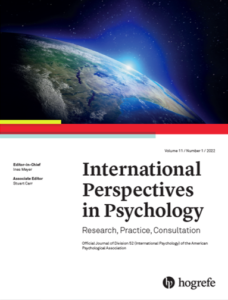
Spring 2022 – Volume 26, Issue 1
Editors: Joyce Yip Green and Erinn C. Cameron
Table of Contents
Message from the President
Division News
- APA Council of Representatives Report
- Update from the Coalition for Psychology in Schools and Education (CPSE)
- International Environmental Justice Committee
- Candidates for 2022 Division Elections
Collaborations
- Perception of Treatment of Pelvic Organ Prolapse: A Collaboration with Karuna Shechen
Global Perspectives
-
In recognition of International Women’s Day and the upcoming 66th annual meeting of the UN Commission on the Status of Women
Early Career Professional Corner
- Early Career Professional News
- 2022 Early Career Professional Leadership
- Early Career Professional Highlights
- Early Career Professional Engagement
Student Corner
- 2022 Student Elected Leadership
- Div 52 Student Highlights
- Student Engagement
- Events
Webinars
International Perspectives in Psychology
- Dancing in Big Shoes to Diverse Tunes
Book Review
- International Collaboration in the Study of Positive Youth Development Among Marginalized Ethnic Minority Adolescents Globally
Member Opinions
- Reproductive Justice, Mental Health, and Human Rights – A Call to Action
Announcements / Opportunities
- CEGENSA International Women’s Day Webinar Series
- GNPHR Webinar
- Call for Submissions to Personality and Social Psychology Review
- PACE Conference
- EJER Congress 2022
Note from the Editors
Art/Poetry Corner
Love, Alexander Milov, 2015

Message from our President
Kurt Geisinger, PhD
My fellow colleagues, let me begin my year as president of APA’s Division of International Psychology by saying what an honor it is to serve as your president. And I hope that you can tell if you read this column that I love 52, its mission, and international psychology. In this column, I will share some of my plans for the year and why I think that this division is so critical to both APA and psychology’s future. I also hope to tell you how we plan to celebrate the Division’s silver anniversary. I begin with why Division 52 and International Psychology is so critical to APA’s health.
What a great membership we have! I am especially pleased that last year all members—students and full members were given the right to vote. And in opposition to what we sometimes see on the national political stage, we were pleased to open votes to students and all our members! We are all members; we are all colleagues yet, we are a very diverse group—not only from all around the world, at all different ages and ethnicities, speaking different languages, and at different stages of our respective careers. The best musical sounds are when an orchestra plays, and each member plays a different instrument, but we do so all together, the music and the harmony is best. Hopefully, we work together for the common good.
First, let me remind some of you that I studied for a year in Europe as an undergraduate, served as a board member, treasurer, and president of the International Test Commission, as a board member, division president, and treasurer of the International Association of Applied Psychology, and as APA’s delegate to the first International Standard Organization’s standard on psychological testing and personnel selection, representing the United States. I know how strong psychology is around the world, and while Americans can teach psychologists from other countries some things, they can teach us just as much. I have worked within APA divisions and on committees, task forces, and even on the APA Board of Directors but have come to believe that APA remains too America-focused. What was it we learned about America’s delayed entry into World War II? America has oft been isolationist, and that seems to hold in psychology too, where sometimes it appears we are even more interested in professional matters in individual states as opposed to the entire country, much less the world. We need to expand our borders (not literally) and to listen to the voices of the world. And as was stated at the first Pan Caribbean Psychology meeting, as well as the first Pan African Psychological Association meeting, both of which I attended, we must also accept that America does not hold all the answers, that what psychology does and studies in different countries may vary from ours, because the truth is not located in any single country. I was in Hong Kong once at an international psychology meeting when a very distinguished psychologist with whom I worked when I was on the APA Board of Directors said to me something to the effect, we need to get more psychologists to these international conferences; they simply would not believe the quality of the work being done throughout the world. My thoughts exactly. I watched President Larry Gerstein last year as he took step after step moving APA to more of a global perspective. Each of us needs to take those same steps and lead in so doing, as does APA in my humble opinion. We Americans must learn to think more broadly and abroadly.
This year is Division 52’s 25th year of existence, our silver anniversary. As one part of our plan to celebrate, I have asked six distinguished international psychologists to provide webinars to our division, and those webinars will be available on our division’s YouTube page at a later point, for use, for example, in classes or with small groups. I wanted a representative group of international psychologists and to accomplish this goal, I selected three men and three women, three from the United States, and three from outside the United States. Our six presenters will be (in alphabetical order): Florence Denmark, Rolando Diaz Loving, Lori Foster, Janel Gauthier, Brigitte Khoury, and Danny Wedding. It is an extremely distinguished group, and when I recently shared the names of the presenters to the three division vice presidents, one of them made mention of what an impressive group it is. We are celebrating the way scholars and intellectuals do, with knowledge. Please stay tuned to learn more about these presentations. I think that we will all find them interesting and informative! If you have ideas for Division 52, please do not hesitate to contact me, or any committee chair or vice president. We in leadership are all servant leaders. We are successful if you are successful, and we are happy when you are happy (well at least some of the time).
What I learned in the APA Council of Representatives
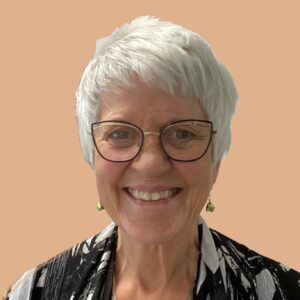
Merry Bullock, PhD – D52 Council Representative
In the last weekends in February, I attended the APA Council of Representatives as a new member representing Division 52. I followed in the shoes of Neal Rubin, who represented D52 for the last six years.
The Council of Representatives is the governing body of APA that sets policy (through passing resolutions that commit APA to particular directions, priorities or advocacy positions), that approves guidelines, and that receives reports on “big topic” task forces (like climate change or ethics issues). The 180 or so members of council are representatives elected by Divisions and State, Provincial and Territorial Associations, the APA Board of Directors, an APAGS representative, and representatives from each of four ethnic minority associations.
What council does during its two days is driven by the “Agenda Book” which, this time, was close to 800 pages of text outlining all the materials on which Council would take action. As a council rep, we learned in one of the many orientation session held on ZOOM in January and February, our job is to read these materials and be prepared to discuss them and vote on them. I realized in reading the book, and during the council meeting that this really is where we can have an impact as a division that believes that APA will be well-served by adopting a more global lens – by being sure that, when appropriate, APA’s policies and statements reflect this perspective.
Caucuses
As you may know, members of the Council also organize themselves into a number of “caucuses” representing various interests (such as public interest, women, education, science, practice, ethnic minorities, rural, health). The caucuses meet prior to the council meeting to discuss agenda items and to hear issues, pros and cons, especially for those items that might be controversial. It is also a chance for the developers of the agenda items to make revisions based on caucus discussions.
And this year there was a new caucus in the line-up! Three of us from Division 52 (Michele Ribeiro, Tony Puente and I) launched the Caucus for Promoting Global and Human Rights Perspectives to bring the goal of infusing discussion with a global and human rights lens to the council floor. The stated goal of this caucus is to “Help APA fulfill its strategic mission to be a global partner and to be a human-rights engaged organization.” Concretely, the caucus will discuss how APA can implement actionable initiatives from two earlier resolutions on promoting a global perspective at APA and on human rights. This is a great opportunity to help develop policies, statements and initiatives through a global / human rights lens. Michele and I are the co-chairs of this group. We were thrilled about 40 council members came to this inaugural meeting (which took place at 6 am for those on the west coast!) and anticipate that we will ask for issues and ideas from Division 52 members as this group moves forward.
The Council Meeting
The council meeting proper took place over 12 hours on February 25 and 26 on ZOOM. The meeting was opened by APA President Frank Worrell, who began by reminding Council of our (APA’s and the US’s multi-ethnic heritage, and noting that “..changes in attitude, climate, and culture take time.. and that “APA has to be supportive of giving rights to all, enlarging the center so that everyone has a voice and can decide their destiny.”
These remarks set the stage for an active and engaging discussion and council went through its agenda. Here are some highlights:
Ukraine
In response to the escalating aggression in Ukraine council drafted and approved a statement of solidarity with Ukraine. I was the main mover and there were more than 75 co-sponsors (and about 15 who helped draft the final wording). You can see the text here: https://www.apa.org/about/policy/solidarity-ukraine
Guidelines approved:
- National Standards for High School Psychology Curricula. This is important for D52 members to know about because there is an opportunity to help develop learning materials to encourage a global lens and to bring human rights documents into the curriculum. Please stay tuned for more on this topic
- Guidelines for Assessment and Intervention with Persons with Disabilities
- Guidelines for Child Custody Evaluations in Family Law Proceedings
- Guidelines for Ethical Conduct of Behavioral Projects Involving Human Participants by High School Students
- Guidelines for Ethical Conduct in the Care and Use of Nonhuman Animals in Research
Policy statements approved:
- Psychology’s Role in Population Health – this is a broad statement calling on psychologists to learn about population health, work across disciplines and with community partners on improving the health, health equity, safety, and well-being pf populations and promoting prevention and early intervention strategies
- Resolution on Interrogations of Criminal Suspects, recommending procedures shown by research to reduce false confessions
- Resolution on Poverty and Socioeconomic Status which urges APA to advocate for culturally sensitive and inclusive research that examines the causes and impact of poverty across the lifespan
- Resolution for Reproductive Justice: Affirming Abortion Access, which commits APA to continuing to work for and support reproductive justice
APA Procedures and Activities:
- The membership will be asked to vote on a proposal to allow APA Associate Members to vote after 1 year of membership
- A question on the APA membership form that asks about whether the applicant has ever been convicted of a felony will be removed. Proponents of removing the question argued that it was discriminatory, deterred otherwise qualified people from joining the association and needlessly stalled the process of becoming a member.
Reports received:
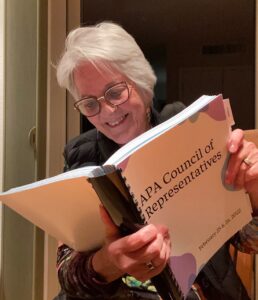 Report of APA Task Force on Climate Change: “Addressing the Climate Crisis: An Action Plan for Psychologists.”
Report of APA Task Force on Climate Change: “Addressing the Climate Crisis: An Action Plan for Psychologists.”
In addition, council heard from APA’s CEO Arthur Evans about his vison for the future and from Maysa Akbar, from the APA Equity, Diversity and Inclusion office on APA’s anti-racism activities audit and on plans for coming back to council in August with a road map for how APA is going to work to dismantle racism within the association and more generally.
Please feel free to contact me about any of the information discussed or voted on at the APA Council meeting. In addition – in case you didn’t know – all APA members can access all the agenda books for The APA Council (and APA Boards and Committees). Look here: https://www.apa.org/about/governance/bdcmte/secure/agenda-books/index?_ga=2.95003224.570760545.1646371108-1832514925.1642186815
Update from the Coalition for Psychology in Schools and Education (CPSE)
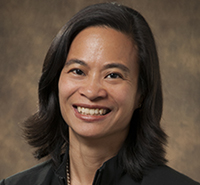 Patricia H. A. Perez, PhD
Patricia H. A. Perez, PhD
The Chicago School of Professional Psychology, Online Campus Division 52 Representative
The Coalition for Psychology in Schools and Education (CPSE) includes members who represent various APA divisions. I am pleased to be the Division 52 representative since December 2019. CPSE’s mission “is to bring together interested psychologists to promote and make publicly accessible applications of the research that psychology has developed to assist the nation in improving the quality of public and private pre-K to 12 education” (https://www.apa.org/ed/schools/coalition).
As a group, our meetings are semi-annually (June and December). Our last meeting was held on December 3-4, 2021 virtually. As a whole, we continue working on projects related to homeschooling, ethics in education, school-based mental health professionals needs survey, lessons learned from COVID-19, CDC-funded professional development project/mental health primers, ethnic and racial educational disparities checklist. Please see the projects I continue to participate in and on behalf of the Division.
Mental Health Primers: This working group was launched in 2018. These primers assist teachers with relevant research and strategies for addressing mental health issues of their students. With funding from CDC, we are polishing these primers to be included for teachers’ professional development focused on racial and ethnic disparities. Please see completed mental health primers here: https://www.apa.org/ed/schools/primer.
Lessons Learned from COVID-19: This working group was developed in 2021 as response to understanding the challenges, impact and positive solutions moving forward as a result of the COVID-19 pandemic. Leading the Mental Health and Well-Being subcommittee, our discussions for product development are for teachers, school administrators and parents/caregivers.
Ethnic and Racial Educational Checklist: This working group’s product is a checklist geared for schools to identify ethnic and racial disparities across all aspects of school.
Our next meeting is scheduled virtually on June 3-5, 2022. If you are interested in learning more about CPSE and our work, please feel free to contact me at pperez@thechicagoschool.edu.
International Environmental Justice Committee
The International Environmental Justice Committee (IEJC) was approved in November 2021 by DIV52 to collect and produce information and promote events and activities about environmental and inequalities challenges in international psychology. IEJC fosters discussion and action about theoretical, professional, therapeutic, educational, and ethical aspects of human conduct in the ecosystem.
The current situation: a call for action
According to the UN, “Sustainable Development Goals” meet the needs of the present without compromising the ability of future generations to meet their own needs. The forms of relationships that humans have established among themselves and with non-human components of the ecosystem jeopardize the survival of humankind and a large part of the planet’s life as we know it.
There are at least two different meanings of the term “sustainability.” First, those familiar with grant applications know that a successful project must be “sustainable” in the long term. It means that once the grant is over, it must be economically self-sufficient. Another meaning of “sustainability” is the ecological one. An ecosystem is indeed a complex whole in which diversity thrives. The whole is a system in dynamic equilibrium, maintaining homeostatic stability and holographic properties (the system can maintain dynamic equilibrium even if the size of the whole is increased or reduced). Finally, the system can maintain homeostasis from different pathways through equifinality. An ecosystem is thus not “sustainable” in economic terms. Human action has produced challenges to sustainability through anthropic action in global warming and pollution. Also, a specific economic approach has contributed to the reduction of diversity, the oppression of first nations and original communities, social and economic injustices related to environmental and colonial exploitation, environmental migrations, treat to the existence of traditional cultures, the sanitary crises produced by anthropic action on the environment, and so on.
Humankind’s concerns for the future are ambivalently oscillating between hope and despair. These phenomena affect the human psyche in clinically significant forms such as environmental trauma, environmental grief, and solastalgia. Moreover, they concern the ecosystemic nature of human-human and human-environment relationships. Some of the great theories in psychology emerged from the global existential preoccupations – for instance, across the World Wars – by people who were concerned about the nature and future of the human condition. To name but a few, Freud, Milgram, Lewin, Becker, Adorno were committed to discussing the reason for evil in the world and how to avoid the errors and horrors of the past. International psychology, which addresses global issues of the human psychological experience, is particularly committed to the current challenges. Times are ripe to work on new epistemological, theoretical, and practical directions.
The IEJC mission and vision
We promote the idea that the way to a better, more fair, just, and sustainable future may result in a hopeless effort unless it stays at the individual level. No one heals alone, no one is safe alone, no one thrives alone, and no one survives alone. So, we invite all DIV52 members to contribute to the endeavour with enthusiasm and compassion. IEJC will promote and support actions such as:
-
- Collect and make available sources about the psychological aspects of environmental challenges
- Promote events (webinars, conferences, scientific collaborations) at the international level;
- Organize a special issue of IPP journal on these topics;
- Promote networking and joint research projects at the international level to advance knowledge about the psychology of EG;
- Promote formative activities (webinars; courses) for students and professionals;
- Promote interdisciplinary collaboration with other international actors.
IEJC will launch a webinar series, an event for Earth Day on April 22nd, and a newsletter in the coming months. Members can follow the activities on our webpage: https://div52.net/apa-division-52-international-environmental-justice-committee/
IEJC will collaborate with the other DIV52 and APA bodies, such as the Advocacy Committee, the Student Committee, The Webinar Committee, and the International Committee for Women. IEJC will also build networking between different global organizations committed to environmental justice and create a board of multidisciplinary experts to widen the knowledge base beyond psychology.
International Environmental Justice Committee Inaugural Members







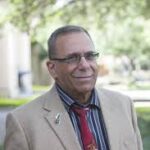
Candidate Statements for 2022 Division Elections
APA will open the ballots for Division Elections in April 2022. At that time, Division members will receive an email from APA to vote in the election. In the meanwhile, Division 52 is proud to announce its candidates for elected positions in the Division and to post their candidate statements.
Open positions for 2022 (to assume office in January, 2023) include:
- President Elect – Candidates – Mark M. Leach, PhD; Giuseppina (Pina) Marsico, PhD
- Secretary – Candidates – Brien Ashdown, PhD; Yu-Wei Wang, PhD
- VP for Communication – Candidates – Deborah L. Best, PhD; Joyce Yip Green, PhD
- VP for Initiatives – Candidates – Frederic P. Bemak, EdD; Julie Hakim-Larson, PhD
- ECP Chair—Elect – Candidates – Rawan Atari-Khan, PhD; Amy Sisson, PhD
- Student Chair—Elect – Candidates – Neha Srinivas, BA (only student members are eligible to vote for this position)

Perception of Treatment of Pelvic Organ Prolapse in Nepal:
A Collaboration with Karuna Shechen
by Anna Rae, Ph.D. Candidate, International Psychology
The Chicago School of Professional Psychology
Mothers who have residual post-partum pelvic pain may feel like their body is no longer their own while they give the gift of life to others. They have particular physical and social support needs (Guerra, 2020; British Broadcasting Corporation, 2018). Many women experience changes in their behavior – physically, psychologically, and socially – to help them cope (British Broadcasting Corporation, 2018; Rostiminia et al., 2020). Often, these concerns go unscreened or are minimized (Johnson et al., 2021). They are also influenced by several cultural factors: work trends through and after pregnancy; age at first pregnancy; number of births access to health care; and care coordination (Dhital et al., 2013).
In support of International Women’s Day, I would like to highlight Karuna Shechen that operates in India, Nepal, and France with a goal of reducing human suffering (Karuna Shechen, 2022). I collaborated with them to evaluate some of their pelvic organ prolapse services they provide in Nepal. As a student, I learned from them about local culture, national culture, some recent events, the importance of religious observance, familial communication in dyads and as a whole entity, traditional practices such as the dowry process, child marriage, and how the intersection with poverty influences pelvic organ prolapse. I also accepted suggestions for topics to look up to learn about local culture.
This study determined a patient’s perception of their health care system’s treatment of pelvic organ prolapse (POP) and its effect on quality of life. It reviewed POP treatment protocols and systemic considerations across multiple countries. This concurrent-nested study utilized the convenience sampling method with N=196 and examined the effect of the POP diagnosis and treatment on quality of life (QOL) for Karuna-Shechen female participants in Nepal. The study found a statistically significant effects for treatment type, level of POP, and having the financial means to meet one’s needs all affected participants’ physical health, psychological health, social relationships, and environmental QOL and QOL overall. Three focus groups examined how POP education from Karuna Shechen affect QOL utilizing the participant ranking method. The groups reported education affected QOL negatively if there were painful side effects of treatment that occurred due to participants gaining education about their condition. The groups also reported education positively affected QOL because it led to treatment which yielded increased physical movement, POP risk reduction for future generations, increased assertiveness through the treatment process, and decreased familial and communal discrimination. Results will be used to help inform Karuna Shechen process improvements. This study provided a methodological example for health systems to utilize when examining POP services to identify systemic process improvements.
Karuna Shechen helps give women a voice; they are no longer suffering in silence. Discussing pelvic pain can help raise awareness and change norms around sex and healing across societies. Help keep the discussion going. I encourage all those in helping professions who know of a patient experiencing pelvic pain access care and keep seeking out appointments until she feels heard.
For more information on Karuna Schechen, go to https://karuna-shechen.org/
References
Barnett, E. (2018, November 29). Why maternity leave can be harder and lonelier than you imagine. British Broadcasting Corporation. https://www.bbc.com/news/business-46221187
Dhital, R., Otskuka, K., Pudel, K., Yasuoka, J., Dangal, G., Jimba, M. (2013). Improved quality of life after surgery for POP in Nepalese women. BMC Women’s Health, 13(22). DOI: 10.1186/1472-6874-13-22.
Guerra, S. (2020, December 28). Prenatal & postpartum pelvic pain: causes and treatment. Ivyrehab network. https://www.ivyrehab.com/news/prenatal-postpartum-pelvic-pain-causes-and-treatment/
Johnson, K., Williams, P., Hill, A. (2021). The importance of information: prenatal education surrounding birth-related pelvic floor trauma mitigates symptom-related distress. Journal of women’s health physical therapy. 00(0), 1-11. DOI: 10.1097/JWH.0000000000000229
Karuna Shechen (2022). News. https://karuna-shechen.org/news/two-decades-impact/
Rostminia, G., Routzong, M., Chang, C. Goldberg, R., Abramowitch, S. (2020). Motion of the vaginal apex during strain and defecation. International urogynecology journal, 31, 391-400. doi.org/10.1007/s00192-019-03981-2
In recognition of International Women’s Day and the 66th annual meeting
of the UN Commission on the Status of Women
by Erinn C. Cameron, M.A., Ph.D. Candidate
Fielding Graduate University
In recognition of International Women’s Day and the upcoming 66th annual meeting of the Commission on the Status of Women (CSW66), the Division 52 International Environmental Justice Committee would like to acknowledge the profound adverse effects of climate change for women and women’s rights across the globe. Climate change is a significant human rights crisis for which women are disproportionately vulnerable and has profound political and economic implications for social justice and gender equality. In alignment with UN Sustainable Development Goal 5, empowering women and girls and highlighting their voices is crucial to the decision-making process regarding future solutions to the climate crisis.
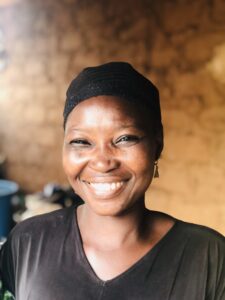
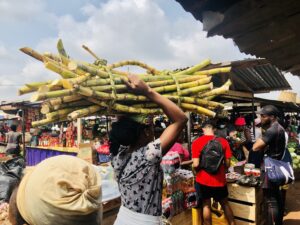
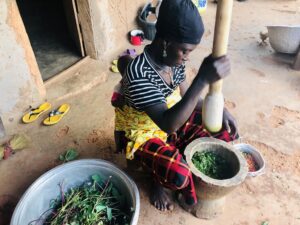
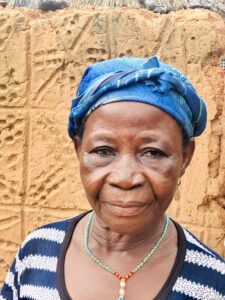
Photos are used with permission and were taken as part of recent fieldwork during an ongoing cross-cultural research collaboration between Division 52 members Erinn C. Cameron, M.A. and Fiona J. Cunningham, M.Ed. (Fielding Graduate University), together with Loren Toussaint, Ph.D. (Luther College), Stephen Baffour Adeji Ph.D. (Akenten Appiah-Menka University of Skills Training and Entrepreneurial Development) in Kumasi, Ghana, and Kristine M. Jacquin Ph.D. (Fielding Graduate University). This cross-cultural research collaboration grew out of relationships formed as part of the 2021-2022 APA Learning Leadership Institute program piloted by the APA Office of International Affairs and APA past-president Jennifer F. Kelly, PhD, ABPP.
These photos represent women in Ghana who depend on agriculture for their livelihoods and to provide for their families. Gender is one of the many components of diverse intersecting identities that can profoundly impact how women experience climate change. The adverse effects of increased mean land temperatures and variable rainfall have significantly impacted geographic areas such as Sub-Saharan Africa, where water scarcity is a growing concern. Climate change disproportionately affects women and girls and other already vulnerable populations, which studies have indicated are less capable of adapting to present and future climate change impacts. Additionally, we know that widespread structural and cultural gender inequalities are identified barriers to women’s successful adaptation to growing climate variability. Our research team, along with the Divison 52 IEJC Committee, researchers, scholars, and activists across the globe, strongly recommend that a gender-informed perspective is needed to inform global climate change adaptation and resilience strategies.
Early Career Professionals News
Greetings Division 52 Colleagues!
I hope that 2022 has been treating you well so far. We have been hard at work in the ECP trio to establish improved communication, engagement, and outreach. We are looking forward to this year’s APA Convention and have already begun planning for such. We also recently completed our survey of the needs and interests of ECPs and students for 2022. One of the most prevailing themes among these members of the division was the opportunity for increased collaboration and networking with regard to both career and international research interests. We hope to meet this need throughout the year, and especially so at the convention. Please be on the lookout for our suite programming targeted towards collaborative international research discourse. We hope to see you there!
Next, both ECP members on the slate for the upcoming APA Division 52 Election were asked if they would like to contribute an entry focused on International Women’s Day. Dr. Amy Sisson offered the following on her own work nationally, as well as the international needs and ramifications of such work:
“Victims of Intimate Partner Violence (IPV) is a problem mostly faced by women and is a borderless phenomenon; however, response to victimization should be tailored to meet the needs of each survivor, with culture being an important consideration. Rural victims of IPV may face challenges different from their peers in other areas, such as no access to cellular service/broadband, meaning they cannot reach out for help during a crisis. Additionally, public transportation is nonexistent in many rural places, and lack of resources can make it hard to leave an abuser. This is true for many rural areas across the globe.
In my work developing programming for domestic violence services in Appalachia, it is evident that what works in urban areas will not work here. On the micro-level, community collaboration is necessary to make needed services available because of limited resources for women and those assisting them. In terms of macro-level changes, policy work is necessary. For instance, it is important to make local and state governments aware that the lack of broadband in rural areas is not about luxury but safety.
International Psychology has a role to play in meeting the needs of women globally. It requires understanding specifics and universals of IPV, resulting in the need for unique interventions. We have a call to research best practices for all people groups so survivors of IPV can move forward and thrive.”
by Amy Sisson, Ph.D.
Thanks for your words and your work, Dr. Sisson!
We believe that the work that international psychologists do creates more equity around the globe, especially for those that see “women are not the problem, but the solution. The plight of girls is no more a tragedy than an opportunity,” and they indeed hold up “half the sky” (Kristof & WuDunn, 2010, p. 18).
Finally, our hearts are with the conflict in Eastern Europe, and we seek peace for all.
Lora Erickson
2022 ECP Chair
2022 Elected Early Career Professional Leadership
2022 Early Career Professional Chair and Representative to the Division 52 Board

Lora Erickson, Ph.D., LHMC, LCPC, serves as the elected 2022 Early Career Professional Chair for Division 52 and is a representative to the board. She is a licensed clinical mental health counselor in the states of Illinois, Florida, and Colorado, an international psychologist, and a professor. She currently teaches full time for The Chicago School of Professional Psychology (TCSPP) in the Master of Arts in Psychology program for the online campus. She is also a dissertation chair and committee reader with TCSPP in the international psychology doctoral program. Her research interests include the cross-cultural study of resiliency and protective factors, emergent professional identity models within the field of international psychology, Animal Assisted Intervention stress reduction techniques, social dislocation, and migration with dignity. Lora also served as the co-chair for the highly successful Divison 52 Suite Programming for the APA 2021 annual convention.
Early Career Professional Chair-Elect

Congratulations to Tatyana El-Kour, Ph.D. who is our elected Early Career Professional Chair-Elect for 2022.
Early Career Professional Past Chair

Juan Antonio Valdivia Ph.D. served as the 2021 Early Career Professional Chair. He is a clinical/educational psychologist holding degrees from Universidad Autonoma de Nuevo Leon (B.S. Clinical Psychology, and M.S. Psychology), and a Doctor of Educational Psychology with a specialty in Measurement, Evaluation, and Research from Washington State University. He obtained postdoctoral training at the School of Humanities and Education of Tecnológico de Monterrey. He is an active member of Mexico´s National Research System (SNI-C).
Early Career Professional Highlights
Lora Erickson and Viviane Pecanha recently published an article on women and resilience in Guatamala. Their article demonstrates the importance of cross-cultural collaboration among the authors (the United States and Brazil) to conduct a non-Western study in Guatemala. Their article addresses two objectives from the 2016 to 2030 United Nations Sustainable Development Goals. Goal 3 is the provision of assurance for healthy lives and the promotion of well-being for all which this article supports via humans as relational beings and the contributions of social support for the development of resiliency. Goal 16 is also acknowledged in this article encouraging inclusive relationships between societies and institutions (United Nations, 2015).
Erickson, L. L., & Pecanha, V. (2021). Young emancipated women in Guatemala: Examining social support contributing to resilience. International Perspectives in Psychology: Research, Practice, Consultation.https://econtent.hogrefe.com/doi/epdf/10.1027/2157-3891/a000013.
Early Career Professional Engagement
The Division 52 ECP trio is currently meeting monthly and analyzing the data from their interest and needs survey sent out to ECPs and students earlier in 2022. They are also in the process of developing a strategic goal for membership engagement efforts and are looking forward to seeing increased engagement from ECPs this year, as well as an in-person at the APA 2022 convention in Minneapolis.
March 2022 Early Career Professional Committee Meeting:
Friday, March 25th, 10:00am EST
Please email Lora Erickson at lerickson@thechicagoschool.edu for more information.
Div52 ECP Listserv: Follow this link to join the division’s early career professional listserv so that you can stay up-to-date on ECP news and events.
2022 Elected Student Leadership
2022 Student Chair and Representative to the Division 52 Board
Erinn C. Cameron, M.A. is this year’s Student Chair and representative to the board. Erinn is a first-generation university student and a 4th-year doctoral candidate in clinical psychology at Fielding Graduate University. She will complete her doctoral clinical internship at the University of New Mexico Health Sciences Center 2022-2023 in the Integrated Behavioral Health track. She currently lives on an island in the Salish Sea where she enjoys eco-living, making music, cooking, and gardening with her family. Having lived in several countries and participated in academic and humanitarian work across the globe, Erinn brings a wealth of international, cultural, and life experience to her work. Her ongoing research and clinical work focus on human rights, gender inequality, human trafficking/modern slavery, women’s health, and climate change. Check out Erinn’s research here https://www.researchgate.net/profile/Erinn-Cameron. She is also co-chair of the Division 52 International Scientific Cross-Cultural Research Committee, an inaugural member of the Division 52 International Environmental Justice Committee, and the new Associate Editor of the International Psychology Bulletin. In addition to her work with APA Division 52, Erinn is a board member of the International Council of Psychologists and adjunct faculty at Seattle Pacific University.

Aldo Barrita, Student Chair-Elect
We would like to give a warm welcome and introduction to Aldo Barrita! Aldo is the 2022 Student Chair-Elect and will be next year’s student chair and represntative to the board. Aldo is a queer Latinx doctoral student in his 3rd year at the Psychological and Brain Sciences Ph.D. Program at the University of Nevada, Las Vegas (UNLV). He was born in Mexico and migrated to the US when he was 16. He received his Bachelor of Arts in Psychology from the University of California, Berkeley in 2017 with high honors. He received his Masters’s in Psychology at UNLV in 2021. His research focus includes how different forms of discrimination, primarily microaggressions, psychologically impact individuals from marginalized communities. Specifically, he has a special interest in Latinx and/or LGBTQ+ experiences with microaggressions as well as psychometrics. Aldo Barrita currently serves as 2022 Student Representative for the National Latinx Psychology Association (NLPA) and Student Chair-Elect for APA Division 52. He has received recognitions such as the NLPA President citation, NLPA Distinguished Student Award, and Division 52 Anastasi Graduate Student Research Award for his scholarship, leadership, and service. Check out Aldo’s work here https://www.researchgate.net/profile/Aldo-Barrita.
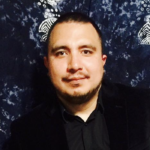
Daniel Balva, Past Student Chair
Daniel valiantly served as the chair of the Division 52 Student Committee for 2021 in which he implemented an unprecedented number of outstanding student initiatives. Check out the many successful initiatives spear-headed by Daniel here https://div52.net/students/. Daniel is a 4th year Counseling Psychology doctoral candidate at the University of Georgia who is currently completing his internship at the VA Pacific Islands Healthcare System in Honolulu, Hawai’i. He has a strong passion for global mental health, multiculturalism and international social justice concerns, juvenile justice, and disability awareness— all of which form the basis of his research interests, leadership involvement in various organizations, and international collaborations and engagement.

Division 52 Student Highlights

Hayoung Kim, M.A. is a doctoral student in the Applied Human Development program at Boston University. Her research focuses on suicide and social support for youth and young adults with machine learning, quantitative research methods. The research paper by her and her colleagues published recently in the journal of Behavioral Science (“Understanding Somatic Symptoms Associated with South Korean Adolescent Suicidal Ideation, Depression, and Social Anxiety”) highlights the cultural context of Korea, where somatic complaints are more commonly reported than mental health concerns, and when reported, somatic complaints are likely to be representative of larger mental health worries.
Kim, H., Richardson, D., & Solberg, S. V. (2021). Understanding somatic symptoms associated with South Korean adolescent suicidal ideation, depression, and social anxiety. Behavioral Sciences, 11(11), 151. https://www.mdpi.com/2076-328X/11/11/151

Fiona Cunningham, M.Ed. is a third-year doctoral student in clinical psychology at Fielding Graduate University. She is the daughter of British immigrants to Canada and currently lives in Newfoundland and Labrador on the unceded land of the Beothuk. She has a Master’s degree in counselling psychology and has worked in community mental health for the past 20 years, primarily with issues of women’s health and survivors of domestic violence. She is honoured to serve as the provincial representative to the Canadian Psychological Association’s Society for the Psychology of Women (SWAP). Fiona is also part of an all-woman global research team investigating issues of trauma, posttraumatic growth, violence against women, and global mental health. Her latest co-authored publication focuses on meaning-making and posttraumatic growth amidst collective trauma. Fiona has several forthcoming peer-reviewed articles for 2022 with a primary focus on violence against women, modern slavery, and climate change. Her dissertation work focuses on secondary traumatic stress in doulas. Check out Fiona’s work at https://www.researchgate.net/profile/Fiona-Cunningham-3.
Student Engagement
March 2022 Student Committee Meeting:
Saturday, March 5th, 10:00 am PST
Please email Erinn Cameron at ecameron@email.fielding.edu for more information.
Div52 STU Listserv: Follow this link to join the division’s student listserv so that you can stay up-to-date on student news and events.
Div52 Student Webpage: Follow this link to find out more information about the student committee and student involvement in Division 52.
Events
https://psu.zoom.us/meeting/
April 21, the 15th annual Psychology Day at the United Nations.
Division 52 Webinars are hour long informational and skill building sessions.
They are open to the public. There is an opportunity for discussion with the presenter.
International Perspectives in Psychology: Research, Practice, Consultation
Ines Meyer, School of Management Studies, University of Cape Town, South Africa
Stuart C. Carr, School of Psychology, Massey University, Aotearoa/New Zealand
Dancing in Big Shoes to Diverse Tunes
The journal’s first issue of 2022 marked the transition of editor-in-chiefs: Stuart C. Carr has handed over to Ines Meyer. Stuart C. Carr continues to support the journal as Associate Editor. Below, please find the link to the Editorial in which the two review what the journal has achieved under Stuart C. Carr’s leadership, where it seeks to go, and how you can contribute to shaping the journal.
https://econtent.hogrefe.com/doi/epdf/10.1027/2157-3891/a000034
Meet the New Editor-in-Chief
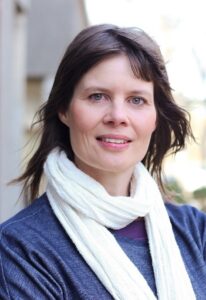
Ines Meyer, the journal’s new editor-in-chief, has served as Associate Editor since 2017. Born and raised in Germany where she studied at Philipps University Marburg, she moved to South Africa in 2001 to complete her doctoral degree at the University of Cape Town. She is a Professor of Organisational Psychology at the same institution where she also holds the National Research Foundation’s Research Chair in Creation of Decent Work and Sustainable Livelihood. Her research applies organisational psychology to alleviating poverty and inequality. Prior to academia, she worked in community development at a non-profit organisation which provided training and organisational development support to community based organisations in South Africa.
International Collaboration in the Study of Positive Youth Development
among Marginalized Ethnic Minority Adolescents Globally
by Arash Nemat
This contribution is about an international collaboration and the product of a long term multidisciplinary project to the study of adolescence in culturally diverse contexts. A recent advancement in the field of Positive Youth Development (PYD) as a powerful strength-based model of human development is the upcoming volume by Radosveta Dimitrova, David Lackland Sam, and Laura Ferrer Wreder (Eds.) (2021). Roma Minority Youth across Cultural Contexts: Taking a Positive Approach to Research, Policy and Practice at Oxford University Press. ISBN: 9780190654061. The volume offers research by a team integrating multiple disciplines (e.g., developmental, cross-cultural, acculturation, positive psychology, assessment, prevention and intervention science, and applied developmental science) in its conceptual, methodological, and analytical approach to advance our understanding of adolescence globally. The authors apply PYD strength-based model for the first time to marginalized ethnic minority youth with a focus on the Roma ethnic minority – a target of public intolerance, social marginalization, and poverty. The application of PYD among stigmatized minority populations provides a major strength of the book focused on innovative approaches for researchers, policymakers, and practitioners to optimal well-being. The volume begins with a foreword by one of the leading PYD scholars Prof. Richard M. Lerner (Tufts University) and follows with 12 chapters interdisciplinary in theoretical, analytical, and methodological approaches (e.g., cross-cultural, multi-national, qualitative, quantitative, mixed-methods, ethnographic) along three parts. Part A – the Current Situation of Roma, Part B – Theories on Roma Adaptation and Well-Being, and Part C – Empirical Findings on PYD and Well-Being of Roma youth. This volume is a valuable resource for research, policy, and practice in international and global psychology as well as more broadly to professionals and scholars interested in human flourishing and thriving.
Radosveta Dimitrova, David Lackland Sam, and Laura Ferrer Wreder (Eds.) (2021). Roma Minority Youth across Cultural Contexts: Taking a Positive Approach to Research, Policy and Practice at Oxford University Press. ISBN: 9780190654061.
Reproductive Justice, Mental Health, and Human Rights – A Call to Action
Nancy Felipe Russo, Ph.D.
Arizona State University
The recent APA Resolution for Reproductive Justice: Affirming Abortion Access¹ is an important step for women’s reproductive health equity in the United States and around the world. It also offers an opportunity for Division 52 to help educate psychologists, professional allies, and public audiences about how abortion access is viewed internationally through a human rights and reproductive justice lens.
When Roe vs. Wade was decided in 1973 based on women’s right to privacy, U.S. abortion rights advocates breathed a sigh of relief believing that abortion access had constitutional protection. But since that time, Roe’s protections have been eroded and the strict scrutiny standard for reviewing abortion restrictions has been overturned.
Meanwhile, concepts of reproductive justice and health equity have been embraced by the UN. In addition to reports related to sexual and reproductive health and rights², the UN has produced a documentary video series Right to a Better World that explores how human rights-based tactics can be used to foster sexual and reproductive health rights around the world³.
UN Reports4 have also detailed how landmark cases related to international and regional reproductive rights can be used to advance protections for reproductive health and rights, including rights related to abortion and maternal health care. Cases are being brought to international and regional human rights bodies and courts where states are being held accountable for their human rights obligations to respect, protect, and fulfill rights to sexual and reproductive health.
Such cases have established groundbreaking international standards on a range of reproductive rights issues, which in turn have been invoked by human rights bodies and courts across the globe to interpret reproductive legal rights. Six precedent-setting cases in particular have been setting new norms and legal standards for laws related to sexual and reproductive health in diverse countries: K.L. v. Peru, L.C. v. Peru, Alyne da Silva Pimentel v. Brazil, Paulina del Carmen Jacinto v. Mexico, R.R. v. Poland, and P. and S. v. Poland. The normative standards established by these cases are keystones in the development of landmark jurisprudence that recognizes the centrality of reproductive rights as human right5.
These normative standards include recognition that denial of legal abortion services can violate a range of human rights, including the right to be free from cruel, inhuman and degrading treatment (Article 7), the right to privacy (Article 17), and the right to special measure of protection for minors (Article 24), among others. In recognizing that denial of access to lawful abortion can amount to cruel, inhuman and degrading treatment, the standards highlight that this treatment encompasses both physical pain and mental suffering.
In sum, the focus of APA’s resolution may focus on domestic abortion access, but the U.S. has much to learn from the experiences of diverse countries in the quest to improve the health of women and children at home and around the world. Division 52 has a leadership role to play in that educational process. What will we do….?
———-
1 https://www.apa.org/about/policy/resolution_reproductive_rights.pdf
2 https://www.ohchr.org/en/issues/women/wrgs/pages/healthrights.aspx
3 https://www.ohchr.org/EN/Issues/Women/WRGS/Pages/RightBetterWorld.aspx
4 Detailed in: https://www.ohchr.org/Documents/Issues/Women/WRGS/SexualHealth/INFO_Abortion_WEB.pdf
5 https://reproductiverights.org/wp-content/uploads/2021/12/12012021_Across-Borders_How-International-and-Regional-Reproductive-Rights-Can-Influencer-Jurisprudence-Worldwide.pdf
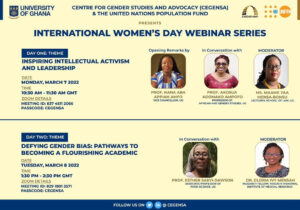
The Centre for Gender Studies and Advocacy (CEGENSA) at the University of Ghana and the United Nations Population Fund (UNFPA) warmly invite you to its International Women’s Day webinar series as follows:
In conversation with Professor Akosua Adomako Ampofo: Inspiring Intellectual Activism and Leadership
Monday, March 7, 2022
10:30AM- 11:30AM GMT
https://us06web.zoom.us/j/
Meeting ID: 837 4511 2066
Passcode: CEGENSA
In conversation with Professor Esther Sakyi- Dawson
Defying Gender Bias: Pathways to Becoming a Flourishing Academic
Tuesday, March 8, 2022
1:30PM- 2:30PM GMT
https://us06web.zoom.us/j/
Meeting ID: 829 1801 3571
Passcode: CEGENSA
GNPHR Webinar
 Webinar March 8, 2022
Webinar March 8, 2022
Women and Human Rights: Concepts, Debates and Implications for Psychology – Dr. Silvia Canetto & Dr. Shawn Burn
Register here: www.icpweb.org/webinars
Call for Submissions: PSPR
Personality and Social Psychological Review (PSPR), the top-ranked journal in those subfields for the past decade, is beginning a new chapter. While we will continue to publish impactful, integrative theory, we hope to usher in an era of publication aimed at socially-engaged work that expands the kinds of topics (and the kinds of authors!) who have typically published in the journal in the past. In particular, we are seeking integrative theoretical scholarship that builds connections between personality and social psychology with other approaches across the broad field of psychology as well as approaches across the social sciences, other STEM fields, the humanities and arts, and to insights gleaned from applied work in the real world. If you develop theory but haven’t thought of publishing in PSPR in the past, we hope you will give us another look. For more information, please check out the editorial philosophy guiding this new chapter at the journal (https://spsp.org/
PACE Conference
International Eurasian Educational Congress 2022
EJERCongress 2022 will be held online in collaboration with Anı Publishing and Ege University. This year’s conference is being held with the co-sponsorship of Penn State Harrisburg and Ege University/Faculty of Education. The main theme of the congress is “Migrations Caused by Regional Problems and the Education of Refugees and Disadvantaged Groups”. Deadline for submissions is April 15th.

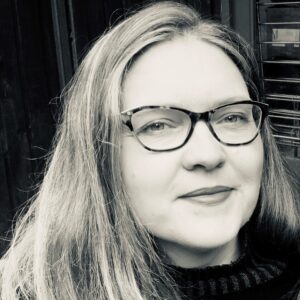
Greetings Division 52 Members!
We are pleased to present this Spring issue of the International Psychology Bulletin, which includes key pieces that focus on the work our division members have done in supporting gender equity and empowerment of women around the world. As we head into this month with International Women’s Day, and Women’s History Month in the United States, we hope that this issue will encourage all of us to advance the rights of women and girls, and eradicate the social, economic, cultural and political barriers preventing women to advance and thrive.
We would also like to thank and acknowledge Dr Stephen DiDonato, for his many years of service to the International Psychology Bulletin as Editor. It was largely due to his leadership and vision that we see a more collaborative and inclusive bulletin today. We wish him all the best as we transition to our current editorial team. Joyce will be taking the role of Editor and we are pleased to introduce Erinn Cameron as the new Associate Editor. We have so many great ideas for the bulletin and would like to continue building a quarterly publication in which we can share current work, opportunities, and inspirations for our field.
All the best,
Joyce and Erinn
Please email us with questions, comments or ideas at ipbdiv52@gmail.com. The deadline for submissions for the Summer issue will be May 20th.

“LOVE” by Ukrainian artist Alexander Milov | 2015

